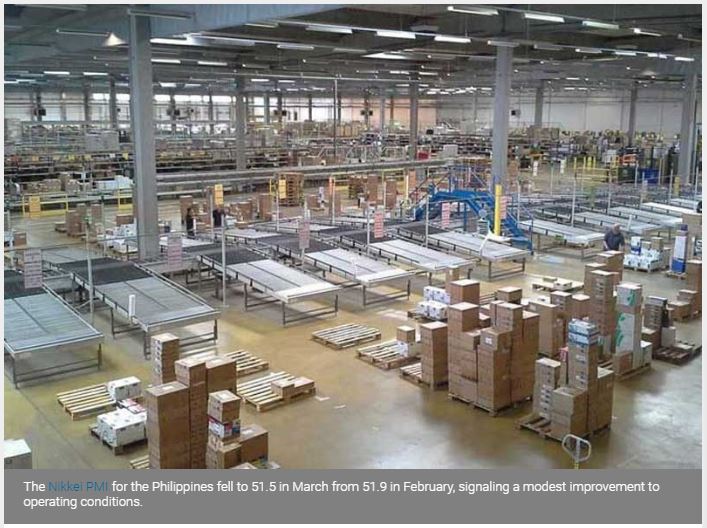Philippines: Factory output in March softest in 7 months
MANILA, Philippines — The manufacturing sector further decelerated in March as it registered its softest output in seven months, the latest results of the Nikkei Philippines Manufacturing Purchasing Managers’ Index (PMI) showed.
The Nikkei PMI for the Philippines fell to 51.5 in March from 51.9 in February, signaling a modest improvement to operating conditions.
A PMI above 50 represents an expansion when compared with the previous month. A PMI reading under 50 represents a contraction and reading at 50 indicates no change.
“Input price inflation dropped to the softest in over three years, while confidence around future output dipped to a record low,” said IHS Markit, the London-based global information provider that collates data for the PMI
It attributed the decline in the headline PMI to the drop in the rate of output expansion in March.
“While many businesses saw volumes of work increase from February, others reported decreased production due to falling sales and reduced supply of raw materials,” IHS Markit said.
It added that new order growth remained solid in March, although still weaker than the series average.
“Manufacturers were boosted by strong customer demand, with some highlighting increased activity in the construction sector,” the report said.
IHS Markit, however, said firms saw a fractional decline in new export orders.
“Anecdotal evidence suggested that weaker overseas demand and administration issues affected sales,” it added.
The PMI survey said purchases of inputs at manufacturers rose solidly, which was generally linked to the rise in overall new orders. Stock levels of inputs also increased, albeit at the softest pace in six months.
Meanwhile, it reported that companies saw further delays to delivery times in March as lead times increased marginally, mostly due to worsening port congestion in Manila.
IHS Markit said these supply chain issues has led to worsened vendor performance in each of the past eight months.
“Port congestion at Manila continues to increase lead times and reduce raw material supply, and will likely harm exports if the problem is not contained,” IHS Markit economist David Owen said.
“However, managers will be pleased with reports of even softer price pressures, which should boost profit margins,” Owen added.
Moreover, the PMI survey showed that employment fell slightly at the end of the first quarter of the year, mainly due to resignations and as well as retirements.
“Firms still managed to reduce backlogs, albeit at the second-weakest rate in nearly three years,” IHS Markit said.
In terms of pricing, Filipino manufacturers recorded a solid rise in output charges in March attributing higher costs. The rate of increase, however, was still weaker than on average last year.
“The rate of input price inflation fell to the lowest in over three years in March. Around 11 percent of panelists saw a rise in costs, mainly due to higher raw material prices and tax laws,” IHS Markit said.
The PMI survey also showed that business sentiment about the future dropped to a record low at the end of the first quarter, as more panelists expressed doubts over output growth this year.
In contrast, firms that provided a positive outlook for production highlighted company growth, greater new orders and product development as key factors influencing activity.
“Overall for the first quarter, the PMI points to weaker growth in manufacturing production compared to the end of 2018, with employment trends also remaining subdued,” Owen said.
Source: https://www.philstar.com/business/2019/04/02/1906444/factory-output-march-softest-7-months#Ujk847imSvtgHd3s.99


 Thailand
Thailand




